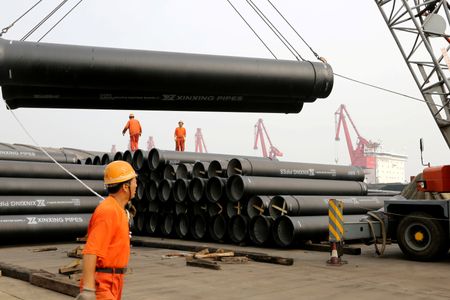By Jamie McGeever
(Reuters) – A look at the day ahead in Asian markets from Jamie McGeever, financial markets columnist.
Asia gets the new quarter underway with a sense of optimism and momentum buoying world markets on the back of surprisingly strong U.S. economic data and a growing belief that risky assets can withstand ‘higher for longer’ global interest rates.
If that can be sustained, Asia potentially has substantial upside relative to other regions – Japan aside, Asian stocks massively underperformed in the first half of the year, and Chinese equities even declined.
World stocks rose almost 13%, Japan’s Nikkei surged 27% – reaching fresh 33-year peaks in the process – but MSCI’s Asia ex-Japan index rose only 1.65% in dollar terms. Blue chip Chinese stocks slipped 0.75%.
Trading volume on Monday may be light due to the July Fourth U.S. holiday, but Friday’s rally on Wall Street should boost risk appetite as investors brace for a deluge of top-tier regional economic data and a couple of policy decisions this week.
Purchasing managers index (PMI) reports on Monday from across the Asia-Pacific region, including China, India, South Korea and Australia, will give the first glimpse into private sector services and factory activity in June.
Consumer price inflation figures from South Korea, Indonesia, Thailand, the Philippines and Taiwan will show how inflation ebbed and flowed across the continent last month, while the central banks of Australia and Malaysia will deliver their latest interest rate decisions.
Monday’s Asian economic calendar is dominated by a raft of manufacturing PMIs including China’s, Indonesian inflation, Japan’s ‘tankan’ business sentiment survey for the second quarter, and Australian housing.
China’s Caixin manufacturing PMI is expected to fall to 50.2 from 50.9, signaling a slowdown in factory sector growth almost the point of stagnation. The official PMI, expected to show a third month of contraction, will be released on Friday.
China’s economic performance since lifting COVID-19 restrictions has been hugely underwhelming, putting the country’s stocks, bonds and currency under heavy downward pressure. China’s economic surprises index has collapsed and is now deeply in negative territory.
Investors will be alert to signs of FX intervention from Chinese authorities to slow the yuan’s decline. The central bank last week surveyed some foreign banks about the interest rates they offer to their clients for dollar deposits, even guiding one commercial lender to lower such rates, sources said.
They will also be wary of warnings from Japanese authorities that the yen’s slide is unwarranted. The yen shed nearly 10% of its value against the dollar in the first half of the year.
Equity investors, meanwhile, will also be digesting Tesla Inc’s announcement on Sunday that it delivered a record 466,000 vehicles in the second quarter, topping market estimates of around 445,000. Sales in China are expected to reach record levels too.
Shipments beat forecasts but only thanks to hefty discounts and incentives. Underlying demand may be much weaker.
Here are key developments that could provide more direction to markets on Monday:
– China, India, South Korea manufacturing PMIs (June)
– Indonesia CPI inflation (June)
– Japan ‘tankan’ business survey (Q2)
(By Jamie McGeever; Editing by Josie Kao)




